
Recently on Cyclingnews.com |
News feature: December 3, 2007
Gent Six Day victors look to Beijing
Elite trackies face decisions in the lead-up to Beijing 2008.
By Gerard Knapp in Gent, Belgium
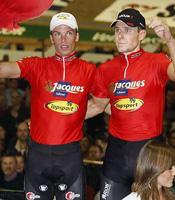
|
While many of the usual suspects in track cycling's elite are half-a-world away in Sydney this weekend, competing in the first round of the UCI Track Cycling World Cup, Belgium's Iljo Keisse and Germany's Robert Bartko, the victors in last weekend's Gent Six Day, are still in Europe, both singling out the upcoming Beijing round of the UCI's track-fest to stake their claim for country and self at next year's Olympics.
In the lead up to an Olympic year, it's always difficult to determine if track cycling is enjoying a resurgence of popularity - you could argue its heyday is so distant that this should be considered almost virgin growth - but Sydney's Dunc Gray Velodrome is buzzing with almost 400 hopeful athletes and good crowds.
Last weekend at Gent's 't kuipke', as the locals call their compact and noisy 166-metre velodrome, the crowds were out in force and full voice, cheering on the local hero, Gent resident Keisse. But Gent is perhaps unlike other Six Day events; it is well attended by locals - given Belgium's cycling culture - as well as many British cycling fans who can reach the friendly and beautiful small Flemish city relatively easily. Event promoter, Patrick Sercu, obliged for the Channel-crossers by ensuring this year's field included the crack-but-not-so-sizzling team of England's Brad Wiggins and Manxman Mark Cavendish.
In theory - based on their track and road-racing records - this duo should have been seriously challenging for the win (surely with Sercu's blessing), not some 39 laps in arrears by the end of the meet. According to experienced watchers, it seems young Cavendish struggled to find his undoubted form after a post-road season lay-off. He still has time to regain his power, as both riders said they were prepared to abandon road cycling's big paycheck of riding the Tour de France in 2008 to focus on capturing gold on the boards in Beijing 2008.
But what is there to expect on the velodrome in Beijing? No rider really knows, as none have ridden on the brand-new track and in the past, the Chinese have perhaps taken a "we can reverse-engineer and build one of these approach" with somewhat disastrous results. The steeply banked bends need to flow evenly onto the short straights; while the inside line has to be sympathetic to the forces pushing the time trialists up the bends. If the pursuiters fight too much to hold their line, fast times become impossible. However, with modern velodrome budgets the wrong side of eight figures, it's expected the Games organizers may have retained consultants who understand that construction of these specialized facilities is something of an acquired art.
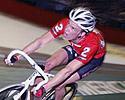
|
It's fair to say - in Six Day racing terms - that Keisse and Bartko's win in Gent was not entirely unexpected. Their 'daring' - for want of a better term - execution of lapping the field with only 15 laps remaining in the final race on the final day of racing to secure the overall win had the crowd stomping its feet, a tribute to their riding, timing and Sercu's sense of building drama and creating entertainment for the well-lubricated crowds (in much the same way the good guy usually wins in the WWF even after being belted across the head and back by noisy but flimsy steel chairs).
This is not to say the racing is below-par compared to the seriousness of the Olympics. The field hurtles around the dizzyingly short track at 60kmh, taking their 'slings' and showing amazing skill to thread their way through the field. It's also highly dangerous. Last year in Gent - in what was an absolutely shocking tragedy - a slight touch of wheels between Dimitri DeFauw and Isaac Gálvez Lopez saw the Spanish dual world champion crash awkwardly into a barrier and die from massive chest injuries (he crushed his upper rib cage which in turn pierced his heart).
If he had hit the rail across his abdomen, it's likely he would have been badly winded. Instead, he left behind a widow and grieving family. Last year's Gent Six was cancelled on the fifth night out of respect for Gálvez and this year, a small and - it has to be said - quite insignificant perspex plaque was mounted on a pylon of the facility to commemorate his loss. Surely, he deserved better.
The crowds realize there is danger and thrills, but no spectator really wants to see their heroes fall heavily. It may have the sound and atmosphere of a circus, but like a real circus, an unplanned fall can silence and devastate the audience. At the Gent Six Day, the riders are like high-flying trapeze artists pulling off triple backflips without a safety net.
Beijing bound?
Keisse is not just the beneficiary of being raised in a great cycling culture and competing in a sympathetic home environment. He can race at the highest level, while Bartko won two gold medals on the track at Sydney 2000. They were a team of contrasting abilities; Keisse the slight, boyish and popular Belgian with perfect English. Bartko by contrast,is an ox; heavy German accent, solidly-built with huge legs capable of pumping out some of the fastest four-kilometre times in history.
The young Belgian - who races on the road for the Chocolade Jacques-Topsport Vlaanderen professional team - is developing the endurance to go with his increasing turn of speed, as evidenced by his third place in the bunch gallop that concluded this year's 193km Kuurne-Brussels-Kuurne road race behind no less than countryman and super-sprinter, Tom Boonen.
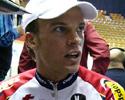
|
There is some recognition by cycling's ruling body that a win at the Six Day does count for something, in terms of qualifying for the Olympics. Or, as Keisse told Cyclingnews immediately after his victory, "the Olympics are a totally different series of races; totally different to anything else in the world (of track racing)".
And it's also to do with the length of the tracks; racing on Gent's 166-metre velodrome - compared to the Olympic and World Championships'size of 250 metres - means that lapping the field can be accomplished in half the time. 'Taking a lap' on a 250-metre track can require up to 16 laps of torturous hard riding off the front of the field, whereas in Gent the field can be caught inside six.
Keisse gestured with his left hand to show a gap of perhaps several centimeters between his thumb and forefinger, to show how a win at Six Day did contribute towards Olympics qualifying. "It's just a little bit, but it all helps". To symbolize a win at a UCI Track World Cup or the Track World Championships, he smiled and opened his arms wide, like a fisherman bragging about his latest catch.
The rules for qualifying for the dwindling track events at the Beijing Games - two time trials were cruelled to allow the entry of BMX next year - have been changed, and not to everyone's approval, either.
Denmark's coach, the legendary Heiko Salzwedel, told Cyclingnews' Karen Forman in Sydney this week that he was becoming increasingly "pissed off" how the smaller nations (in track cycling terms) could face up to three or four 'teams' of riders from the one country, all vying for podium places in qualifying events. Salzwedel's fear is that those hastily-formed pro teams will all work together to ensure they secure as many places as possible for their respective countries.
In timed events, it's hard to see how team tactics could play too big a role, but for the tactical events, like the points score and Madison, he may have a point.
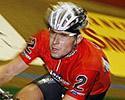
|
This is the scenario that could face Keisse and his even younger team-mate in the Madison, Kenny De Ketele. Their job at the Beijing round of the Track World Cup will be to secure a spot for Belgium in the Madison (this means win). "He (Kenny) is young and a little inexperienced (at that level), but we'll see how it goes." Meanwhile Keisse is confident he can have a very good crack at the points score. And not just qualifying, but winning the major prize later next year.
"In the world's I was second behind (Joan) Llaneras and in front of (Mikhail) Ignatiev, and they are the past two Olympic champions (in the points race)," Keisse said of his silver-medal performance in the 40km points score at this year's UCI Track Cycling World Championships.
"I think it's an advantage to go to China to qualify as I will get to see and ride on the track," he said. He may also need to go to the Copenhagen round of the World Cup, depending on how he rides in China.
Keisse is considered Belgium's brightest hope for a track cycling Olympic medal since Etienne de Wilde and Mathew Gilmore (who's always considered a 'Tasmanian' in Tasmania) secured silver in the 60km Madison at Sydney 2000. At those same games, Bartko was the dominant endurance track cyclist, securing gold in both the individual pursuit and also anchoring Germany's world-record setting team pursuit squad that was the first to break the four minute barrier in the 4km pursuit.
Both Keisse and Bartko told CN they had been assured of national selection; now they just have to get their countries on the line in Beijing. Bartko wants to qualify himself and Germany for the individual and teams pursuit, respectively. The big German said that he usually prepares for the major track events by primarily 'training' in road races, but the Six Day format "is OK. It's a fast pace and there's a lot of riding each night".
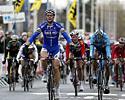
|
Keisse also has his eyes on the road, and with a podium finish in KBK for Chocolades-Jacques this year, he realizes he can also take on the Spring Classics. "I have showed I can race on the road and for 2009, that is where I will really focus my effort."
So what to make of the performances so far on the boards and in Sydney, as well as perhaps the most popular of all the Six Day races so far this season? Not much, really. A mixture of experience and youth filling the podiums, while the times are hardly threatening any world records.
With the Beijing Olympics still almost-a-full road season away, all of the star Athens endurance trackies are either still in holiday mode, but competing nonetheless, or still on holiday, or attending boot camps (depending on their pro road trade teams), while the pure track sprinters are in pumping iron mode.
Still, the Olympics is creating additional interest and from now until August 8, that's all we will be hearing and reading, with careers and aspirations sacrificed in the pursuit of those gold medals. It's all about Beijing, but as Australian sprinter Ryan Bayley can testify, after securing two gold medals in Athens, Olympic success does not necessarily lead to a pot-of-gold afterwards.
Photography
For a thumbnail gallery of these images, click here
Images by Gerard Knapp/www.cyclingnews.com
- Iljo Keisse meets the press after his win in the 2007 Gent Six Day with Germany's Robert Bartko
- Iljo Keisse was swamped for comments from an adoring Belgian media contingent
- Keisse signs away for a young fan who already has the jacket bearing his name
- Germany's Robert Bartko explains the dramatic final win in the 2007 Gent Six he pulled off with Belgium's Iljo Keisse
Images by Luc Claessen/www.ctm-images.com
- Keisse on the attack on the final night. He and partner Robert Bartko came from behind to win in the final event.
- Robert Bartko helped take a lap on the final madison, gaining the win over world champions Risi/Marvulli.
- Keisse & Bartko get the flowers after winning on the final day
- Iljo Keisse (Chocolade-Jacques) finishes third behind Tom Boonen (Quick.Step-Innergetic) at the 60th Kuurne-Bruxelles-Kuurne in Belgium on March 4, 2007. The podium finish in a major Belgian road race gives the track specialist hopes for more big results on the road.
